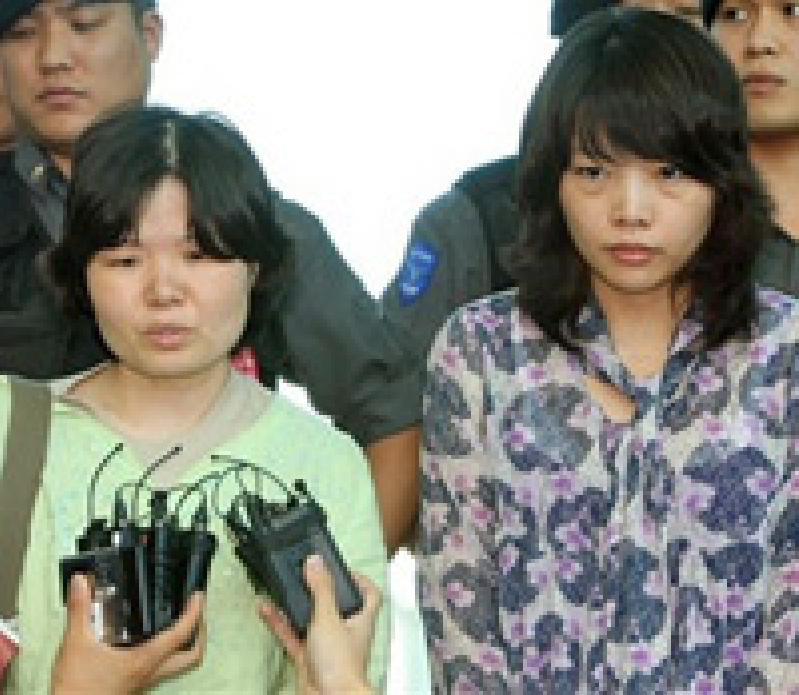
The first two Korean hostages freed by Taliban militants gave a brief statement of apology and thanks to the public Friday upon their return to South Korea.
After nearly a month of captivity by the Taliban in Afghanistan – Kim Ji-na, 32, and Kim Kyun-ja, 37 – landed at Incheon International Airport at 12:19 p.m. Friday (11:19 p.m. EDT Thursday), according to Yonhap news agency in Seoul.
The two females appeared visibly tired as they each gave a brief statement at the entrance gate of the airport.
“We are very sorry that we caused you to worry so much,” said Kim Kyun-ja, according to Yonhap. “Because of your help, we were able to be released, and we would like to heartily thank you.
“For now, we can do nothing but hope that the other people, who are still held by the Taliban in Afghanistan, get released soon,” she added.
Kim Ji-na said: “We are so obliged to you all for your concerns. We are grateful that we were released.”
The two did not answer any questions from the media after they spoke. They were soon reunited with their families at the airport and were then taken to a military hospital in Bundang, south of Seoul, for medical checkups.
Korean officials chose a military hospital because of fear that the hostages’ exposure to the media could adversely affect negotiations for the remaining 19 hostages.
The two freed hostages were the results of four days of intense face-to-face talks between Taliban militants and a Korean delegation at the local headquarters of the Afghan Red Crescent Society that began on Aug. 10. Taliban captors said the two females were released as a “gesture of goodwill” because talks were going well.
A government official who accompanied the two from New Delhi to Seoul said the hostages did not know they were being released until the handover, according to Yonhap.
“As they moved frequently during the captivity, they were thinking that the Taliban were taking them to another place, not noticing they would be released,” the official said.
The official also said that the hostages were cut off completely from the outside world and were not even aware of the deaths of the Rev. Bae Hyung-kyu and Shim Sung-min.
Instead, the two, who were in the same group as Shim, thought he was freed.
“They did not know of the deaths of Rev. Bae and Shim even when they were moved to a U.S. Air Force base in Bagram,” said the official. “They learned the fact on Thursday and were shocked. They cried about 30 minutes. They showed symptoms of anorexia, mental anxiety and have not smiled at all since then,” he said.
Meanwhile, in Afghanistan, the Taliban complained of lack of progress and said their leadership had not decided what to do next.
“The Taliban leading council has not made any specific decisions,” a Taliban commander from Ghazni province, Abdullah Jan, told Agence France-Pressed Friday.
Jan said face-to-face talks would not resume immediately, though he did not rule out the possibility of one later in the day.
An official of the International Committee of Red Cross, which has been mediating the dialogue, said there was “very little probability” of talks resuming Friday, according to AFP.
“The Taliban are still insisting on the release of their prisoners," said Jan.
The Afghan and U.S. government has repeatedly rejected the demand to release prisoners, saying that it would cause more harm than good. Both Aghan President Hamid Karzai and U.S. President George W. Bush have said releasing rebels would further encourage kidnapping as an industry in the insurgency-wracked country and support terrorism.
Taliban rebels are held by Afghan and U.S. militaries, and South Korea is powerless to free the prisoners without the two countries’ consent – a fact that Seoul has repeatedly explained to the Taliban.
It has been nearly a month since the Taliban militants kidnapped the group of 23 Christian volunteers – the largest abduction of foreigners in Afghanistan since the fall of the Taliban regime in 2001 – on July 19. Since then, two male hostages have been killed – the leader of the group, Bae Hyung-kyu, who was found dead on July 25, and 29-year-old Shim Sung-min, whose body was found July 30.






